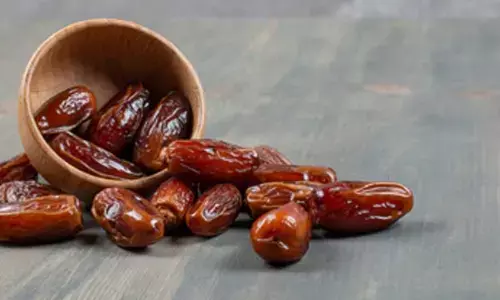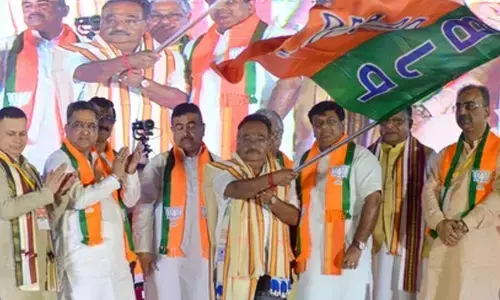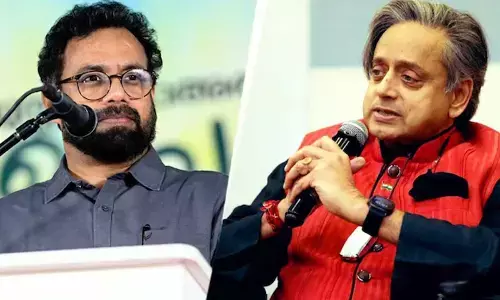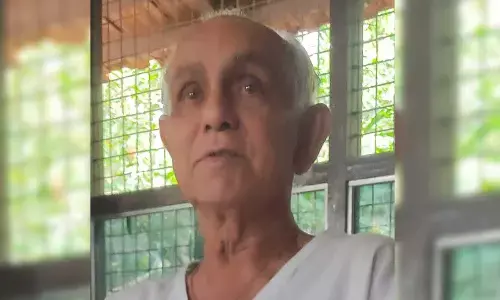BONALU Celebrations started in Telangana State with Gaiety
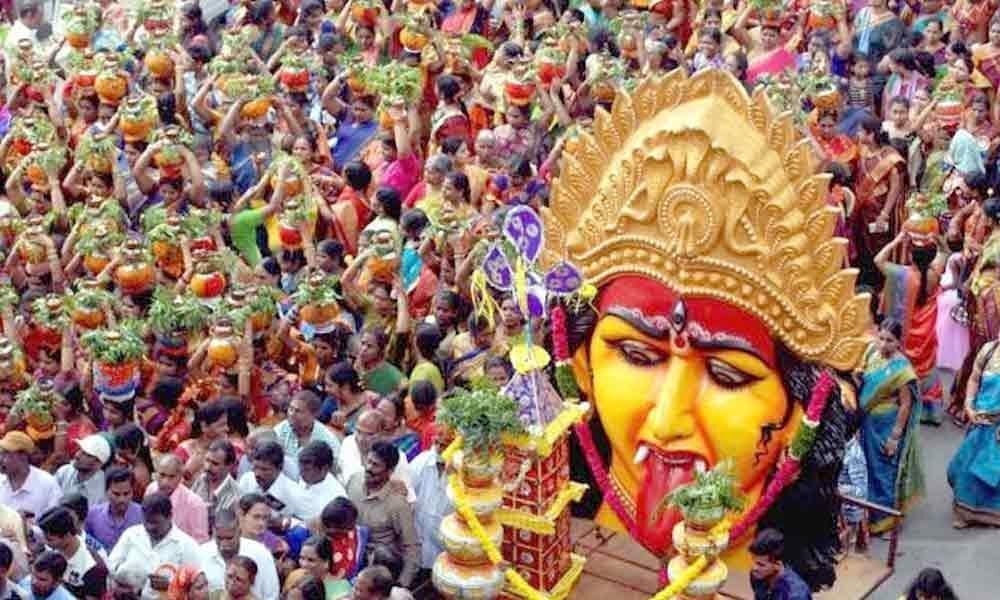
Bonalu Or Mahankali Bonalu Is A Variation Of Durga Matha Festival Of Goddess Mahakali
1. BONALU OR MAHANKALI BONALU IS A VARIATION OF DURGA MATHA FESTIVAL OF GODDESS MAHAKALI.
2. IT IS CELEBRATED IN TWIN CITIES HYDERABAD, SECUNDERABAD AND OTHER PARTS OF TELANGANA.
3. THE FESTIVAL IS BETWEEN JULY AND AUGUST IN THE MONTH OF ASHADA MASAM.
4. THE WORD "BONAM" COMES FROM TELUGU WORD BOJANAM WHICH MEANS "A MEAL" IN TELUGU.
Women prepare "Paayasam" a Telugu sweer in an earthen pot adorned with Neem leaves, Turmeric, Vermilion and a lighted Diya on top of the pot and carry it on their heads and offer it to Mother Goddess across the temples.
5. THE FESTIVAL IS CONSIDERED AS THANKSGIVING RITUAL TO THE GODDESS FOR FULFILLING THE VOWS OF HER DEVOTEES.
6. THE VARIATION OF THE GODDESS.
Bonalu involves the worship of Goddess Durga Maatha in its various forms, namely Kaali, Mysamma, Pochamma, Yellamma, Pedamma, Dokkalamma, Ankalamma, Poleramma, Maremma, Nookalamma, etc.
7. IT IS A VERY YOUNG FESTIVAL.
The Bonalu festival started in 1813 in Hyderabad & Secunderabad, unlike the other Hindu festivals that have been celebrated for thousands of years.
8. THE STORY BEHIND THE FESTIVAL.
A plague disease broke out in 1817, taking thousands of lives in Twin Cities of Hyderabad & Secunderabad. Muslim rulers had previously abolished the diets of Hindu gods. The locals prayed to Mother Goddess in Ujjain's Mahankaal Temple saying if people were saved from the epidemic they would set up Mahankali's idol back in their town. The plague eventually disappeared and the devotees believe that the disease was destroyed by the goddess Durga/Mahankaali. The Hindu deities have been installed back in the temples and since that year people have begun to celebrate the festival every year.
9. THE INTENTION BEHIND THE CELEBRATION.
It is believed that during Ashada Maasam, the goddess returns to her maternal home so that people come to see her and bring food offerings to show their love and affection, just as they would prepare a special meal when their own daughters visit her.
10. THE TOTTELU, FOOD BASKETS GIFT TO THE GODDESS.
Each group of devotees offer a "Thotte," a small colorful structure of the paper supported by sticks as a mark of respect for the goddess.
11. THE TRANCED WOMEN.
Some Tranced women dance in honor of the local goddess to the rhythmic beats of drums with pots on their heads. When devotees ask about the future, they predict the year ahead. This occurs before the procession begins.
12. POTHURAJU, GUARDIAN OF THE REALM.
Pothuraju is Mother Goddess' brother and is represented at the festival by a well-built, bare-minded man, wearing a tiny red dhoti and bells on his ankles, wearing turmeric on his body and vermilion on his forehead. He dances to drums that resound. He is considered the festivities' initiator and the community's protector. With lashing whips and emerald neem leaves (margosa) tied around their waists, accompanied by trumpets and drums, he leads the tranquil female dancers who are under the spell of Mother Goddess to the temple.
13. THE ROLE OF FOOD.
In the festival, food plays a major role. From the snacks sold on the road in Prasadam form to the animals sacrificed to the goddess, later enjoyed as a non-vegetarian meal by the families. It is basically a celebration of the local Telangana people's gratitude and food.
Bonalu, also known as Ashada Jatara, is one of Telangana's biggest festivals. It is observed in the famous twin cities of Secunderabad and Hyderabad and other parts of Telangana once in a year during the months of July/August. Telangana's government declared Bonalu a state festival in 2014.
The Bonalu festival is dedicated to Goddess Mahankali and is held during the Hindu calendar's Ashadha month.
This is a religious day dedicated to the blessings of Goddess Mahankali.
When is Bonalu in 2019?
Bonalu 2019, extending in a month over four Sundays.
It takes place in the Ashadha month's Shashti tithi of Shukla paksha.
It marks the beginning of the Ashadha month, as per the Amanta calendar.
By conducting many special poojas to Goddess Yellamma, the first and fourth day of the Bonalu the festival will be observed.
On July 04th, Thursday, Bonalu 2019 festivities began at Jagadambika temple, Golconda Fort. Celebrations will take place on July 21 at Ujjaini Mahankali Temple in Secunderabad and Balkampet Yellamma Temple in Balkampet. The pooja will start at 4 am and Special Pooja Rituals will go on till 12 pm at Ujjaini Mahankali Temple.
On July 28, Pochamma and Katta maisamma temple Lal Darwaza's Matheswari temple will be celebrating Bonalu. The story behind the Bonalu Festival & its Rituals It is believed that each year, in the month of Ashada, the goddess returns to her maternal home.
People offer them love, respect and devotion throughout the time in the form of dance, and food pots, bangles, and sarees. Just as a family would welcome their daughter's return to their own home, devotees celebrate the Goddess' visit to their own home the same way.
Special meals are offered in order to please her people for this. They believe that on the first Sunday on Bonalu, Goddess Mahankali will wipe away all diseases and a person's sorrows, Puja Rituals.
The rituals will be performed at the temple of Sri Jagadamba in Telangana's Golconda Fort. The second Sunday rituals will take place in Balkampet Yellamma Temple in Balkampet and in Secunderabad in Ujjaini Mahakali Temple.
It is called Lashkar Bonalu. The Ashada month's third Sunday will conduct prayers at Chilkalguda's Pochamma and Katta maisamma temple and Lal Darwaza's Matheswari temple in Hyderabad's Old City. Bonam Offering: Every Sunday, people rise early, have a full bath, wear new, clean clothing. Women, buy new pots from Earthen, wash it and cook in it a mixture of rice, curd, water, and jaggery.
The pot is decorated with red, white and yellow colour combinations. Turmeric and kumkum are applied to the pots. This pot is the goddess's offering. Bonam Jyoti: Women are covering the pot, putting neem leaves on top and lighting a lamp on top and that's what the Bonam Jyoti called.
Women prepare all the pots needed, dress in traditional saree while young girls in lehengas or half sarees put the pots on their heads and dance to the drumbeat as part of the Goddess's honouring ceremony. They offer bangles and sarees together with the filled pots to please the goddess Mahankali. They do this in the belief that such offerings will drive away evil and help them through the Monsoon season to survive.



